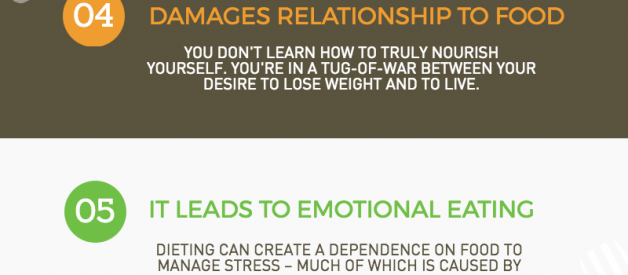
A version of this post originally ran on Green Mountain at Fox Run?s blog, where you can find other great articles on related subjects.
Think back to the last time that you went on a diet.
Maybe it was several years ago. Maybe it was right before the summer. Maybe you?re thinking of starting a new one on Monday! But whenever the last time was that you tried to lose weight permanently through restricting your calories and upping your fitness routine, ask yourself: Did it work?
And I don?t mean ?Did you lose weight initially, and then fall off the bandwagon and gain it all back again?? I mean: Did it actually work? Did you lose weight permanently? Was the practice sustainable? Did you feel satisfied and fulfilled?
I have a funny feeling that the answer is a resounding no ? and for good reason.
These days, health professionals and the public alike agree: Diets don?t work!
Here at Green Mountain at Fox Run, we understood that almost a half-century ago when we pioneered the non-diet approach ? long before alternative approaches to health and wellness started to become mainstream.
We?re excited that these ideas are gaining traction, and that people are recognizing that diets fail them ? not vice versa. And with new science confirming what we (and your body) intuitively understood all along, we have compelling ways to explain the biology and psychology of this common experience.
So read on to learn why diets don?t work ? for you or for anyone ? and what you can do instead to put yourself firmly on the path to ending eating and weight struggles.
Why Diets Don?t Work
It?s easy, really: Our bodies simply aren?t made to sustain long-term significant weight loss because, more often than not, it?s not in our best interests. Dieting goes against a lot of the intuition that our bodies have developed over centuries of evolution.
Here?s how:

1. Weight Loss Through Dieting Is Temporary
The vast majority of people who lose weight through dieting end up regaining all the weight ? it?s not just you. As many as 60% of those gain back more weight than they lost. Done repeatedly ? as many women who struggle with weight do ? dieting can actually cause you to gain weight over time to a level that goes beyond your set point weight, or the weight that best supports your body.
2. Dieting Trains Your Brain to Make Food Harder to Resist
It?s a survival mechanism. We need to eat to live ? calories are converted into energy, and we exist off of that energy. Without it, our bodies start to shut down. So when food is in short supply, hormones kick in that are designed to make sure you eat. Those hormones also make food taste better. The end result is a double whammy that makes food much harder to ignore.
3. Dieting Messes With Your Hunger and Satisfaction Cues
Similarly, weight loss through dieting causes the hormones that are responsible for helping you feel full to drop. At the same time, it causes the hormones that make you feel hungry to increase ? yet another double whammy. It?s your body?s way of ensuring its survival. Because it doesn?t know that food is scarce because you?re restricting it on purpose, it thinks it is facing a famine. Your body thinks it?s helping you by gaining weight ? so that the next time you?re faced with a famine, you?ll have enough fat stored to get you through it.
4. Dieting Damages Your Relationship with Food
You don?t need studies to tell you that this is true ? you?ve experienced it yourself! When we?re on a diet, we struggle to understand what it means to approach food in a natural, intuitive way. You don?t learn how to truly nourish yourself. Instead, you?re in a constant push-pull, driven by your dissatisfaction with your body, between wanting to lose weight and learning how to feed yourself to support your body?s homeostasis.
5. Dieting Causes Emotional Overeating, Leading to Dependence on Food to Manage Stress
Because our bodies are complex, delicate miniature ecosystems, disruptions in some hormone create disruptions in others. Eating a low-calorie diet can actually increase the levels of cortisol in our bodies ? and that?s the hormone related to stress. This might actually lead us to eat more by setting up a reward system in our brain. This can also lead to eating disorders such as binge eating disorder.
6. Dieting Causes Your Metabolism to Slow Down
That means that any calories you do eat are used more efficiently. This makes it not only harder to lose weight, but much easier to gain it back. And it?s gained back primarily as fat ? which simply isn?t most folks? goal with a diet in the first place.
7. Diets Are Often Missing Important Nutrients That Are Essential to Health
Miss out on these nutrients too long ? including on many popular diet programs that you may think are safe ? and you?ll likely find yourself less than healthy. This can also cause weight gain ? it may have nothing to do with calories, but everything to do with the body?s attempt to take care of itself by getting the vitamins and minerals that it needs.
8. Dieting Is Part of the Thin Ideal
This false standard causes immense pain and suffering in the lives of women today. The pressure you feel to diet may have less to do with wellness and more to do with beauty ? and the industry selling you your insecurities has a lot of money invested in it to make sure that you continue to buy diet products. And what?s the only way to keep you buying? By selling you products that are meant to fail.
So trust us: Your diet failure isn?t about you. It?s about the process that we?re using to try to gain health and happiness in our lives. The world?s best kept secret? You can improve your levels of both wellness and joy without dieting.
If Diets Don?t Work, What Does?
So we know now that diets don?t work. But we obviously still want to feel good in and about our bodies. They?re the vessels that carry us through the world, after all ? and it would be nice to have a pleasant relationship with them!
Fear not. There are plenty of ways that we can connect to and enjoy our bodies that have nothing to do with restrictive dieting and compulsive exercising. Here are just seven!
1. Move Your Focus From ?Being? and ?Looking? Good to Feeling Good
This is about changing from the inside out, using intrinsic motivation to guide your decisions. When we?re in touch with what we truly need and want, we can make choices that feel good in the moment ? and long after. The truth is: It?s feeling good that is the reward our brains seek. And dieting doesn?t actually make us feel good. If anything, it makes us feel worse. Mindfulness is the bridge to noticing what makes you really feel good and then doing it regularly.
2. Accept Your Wonderful Self
Okay, okay. Obviously this is a lot easier said than done. And we don?t want to imply that self-acceptance is a cure-all. But the first step in taking care of ourselves is to adopt a non-judgmental attitude towards ourselves, regardless of our size. This allows us to see what?s what ? without interfering self-criticism. Change that is motivated by self-loathing and shame doesn?t last ? it?s hard to take care of something you don?t really like. Many folks worry, though, that if they accept themselves that they?ll ?let go? of themselves ? whatever that means. But that?s a baseless fear. Because rather than causing us to ?give up? on ourselves, self-acceptance actually motivates us to treat our bodies with kindness and respect.
3. Quit Trying to Lose Weight
No. Seriously. We mean it. Set your sights on doing what?s necessary to help you feel good instead. Generally, those are activities that will support our bodies in achieving and maintaining their set point weight. Weight loss, if it?s right for your body, becomes an outcome, rather than a goal. The bonus: With this method, it?s likely to be a lasting result, rather than another yo-yo diet. And it?s pleasurable, which adds to its lasting effect.
4. Stop Dieting
This may sound like a repeat of the previous point, but it?s actually a little bit different, although often related. Here, we?re talking about the experience of paying constant attention to what we?re eating; counting how many calories, fat, or carbohydrates it contains; creating a schedule for when we eat ? and on and on and on. Yup ? all of the things that many of us continue to do even when we say we don?t diet anymore (?lifestyle change,? anyone?). These behaviors lead to a way of eating that often falls far short of what our bodies need for well-being, including supporting a healthy microbiome that plays key roles in our metabolism and immune system. Instead, start eating mindfully ? using your internal cues that are designed to guide you in eating for well-being.
5. Change the Way You Think About Exercise
At Green Mountain at Fox Run, we move our bodies because it feels good. There?s no ?should? or ?have to.? It?s all about want. Ask yourself: What do I want? ? rather than ?What should I do?? The difference is transformational. It replaces anxiety, stress, and shame with a new, exciting relationship with movement, joy, and play that can make physical activity a regular part of your life. Movement doesn?t have to be associated with calories and weight loss. It can simply be one of many ways to enjoy your body and your life.
6. Practice Mindfulness
In today?s busy, stressful world, mindfulness can help you make choices in your own interest. Maybe you?ve heard of this concept, but don?t know what it looks like in practice. You may think you need to take up yoga or go on a silent retreat to learn about it. But no. It?s not about spending hours in lotus position ? although, sure, that?s can be one expression of it ? but instead, practicing being present and aware of what?s going on and the choices you have, and then deciding what is best for you in the moment and over time.
7. Enjoy Life
For real. Happiness leads the way to making choices that support both your physical and emotional well-being. It?s time to stop putting your life on hold until you lose weight. Start to live the full, rich, meaningful life you deserve today.
Of course, we know that making this jump ? amazing at it sounds on the surface ? can be scary. It involves letting go of promises that you?ve likely held onto for a long, long time. But you don?t have to do it alone.
Green Mountain at Fox Run Helps You Put It All Together
Back in 1973, we pioneered the non-diet approach ? and we?ve had the chance to perfect it over the past 44 years. We have spent all that time evolving our approach into livable and practical strategies to make it something that works for busy women at home, where the rubber meets the road. It?s an approach for living the life you want to lead.
Our program focuses on creating lasting change and a deep sense of well-being ? not offering you another BS weight-loss solution. Through powerful tools such as mindfulness, stress reduction skills, and movement customized to your fitness level and body size, you?ll learn to practice self-care in your daily life.
It?s a game changer. And you deserve to learn the skills that will bring you peace in your body. Come visit us at Green Mountain at Fox Run today.
Want to learn more? Check out these other posts we?ve published on similar topics:
- 43 Reasons to Stop Dieting Now
- Weight Loss Diet Schemes Don?t Work ? Especially These
- How I Finally Gave Up Dieting
The original version of this piece was written by Marsha Hudnall, MD, RDN, CD. As president and co-owner of Green Mountain at Fox Run, Marsha has been a voice of reason for over three decades in helping people move away from the diet mentality and understand how to truly take care of themselves. This piece was updated and expanded upon by Melissa A. Fabello.



